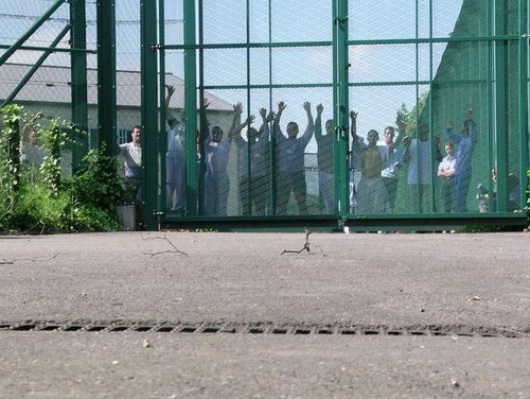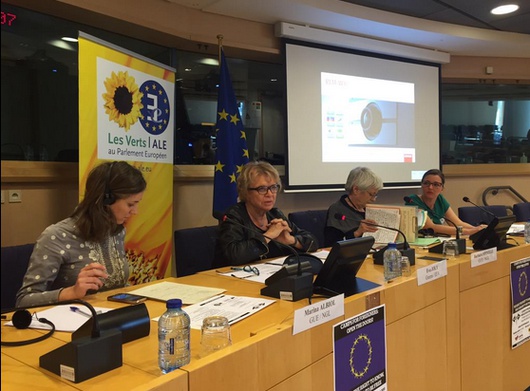![Image for [eng] Open Access Now: for an opening up of closed centres](https://media.cafebabel.com/resized-images/f4/f0/4730ecd39346672a533724f1314de4108b1e.jpg)
[eng] Open Access Now: for an opening up of closed centres
Published on
Translation by:
Una DimitrijevicAfter four months, the Open Access Now 2014-2015 campaign, aimed at denouncing the detention of migrants in Europe, has come to an end. Elected officials, the media and participating organisations met in the European Parliament on April 21 to report their findings.
It is estimated that approximately 600,000 people are currently locked up in holding centres for foreigners in Europe. Lacking sufficient information on these places, the “Open Access Now” campaign seeks a greater transparency of the migrants' detention conditions, all the while demanding the closure of all camps on European territory and elsewhere. Launched in 2011, this project has benefited from the support of organisations such as Cimade (France), S.O.S Racismo (Spain) and the Human Rights League (Belgium). At the end of the 2014-2015 rallies, journalists and civil representatives were invited to a conference at the European Parliament.
A look back at the 2014-2015 campaign
Laure Blondel, coordinator of the project, went over the principal actions implemented during the 2014-2015 campaign. The initial aim was to make the general public aware of the realities of detention in several ways. The interactive and participative cartography “Close the camps” for example, locates the centres and provides precise information about each one. A booklet entitled “The hidden face of camps in Europe” was also published, with the aim of putting the reality of these places into perspective with respect to European and international human rights charters.
 Pleas and appeals were put to the European Commission, and more specifically with regards to the “returns” directive. Its evaluation has been considered highly questionable as the institution does not have access to much of the Member States’ statistical data. Two questions were also tabled by members of the European Parliament. The first relates precisely to the very limited access to statistics on administrative detentions: the Commission answered that it would submit a report in the course of 2015 so that all countries may publish their information. The second question, for the time being unanswered, concerns the unconditional right of entry of NGOs and media into the centres.
Pleas and appeals were put to the European Commission, and more specifically with regards to the “returns” directive. Its evaluation has been considered highly questionable as the institution does not have access to much of the Member States’ statistical data. Two questions were also tabled by members of the European Parliament. The first relates precisely to the very limited access to statistics on administrative detentions: the Commission answered that it would submit a report in the course of 2015 so that all countries may publish their information. The second question, for the time being unanswered, concerns the unconditional right of entry of NGOs and media into the centres.
The campaign also wished to give its support to migrants and their mobilisations by gathering and relaying individual accounts. Online, during public meetings or on radio shows, “Open Access Now” worked to give their speech back to the detained and their families.
Lastly, 16 visits by European and national Parliamentary members took place in camps in France, Italy, Spain and Belgium.
Open the doors !
Country by country, the speakers detailed their visits, often drawing the same conclusions. All denounced the deplorable living conditions which undermine basic human dignity. According to the Eurodeputy Marina Albiol (GUE/NGL), the funds allocated to these centres in Spain are above all used to reinforce security measures, and not to improve living conditions for the people there.
The speakers also pointed to the very prison-like nature these places. Enclosure, abusive security measures, and sometimes even punishment in isolation cells mark the daily life of the detained, those who are only guilty of an administrative error. Moreover, contact with the outside is very limited: no access to judicial or translation services, no information given as to the development of the procedure or a potential right to international protection.
 Lastly, the campaign has made it possible to highlight the limited access to these places as well as the lack of transparency which surrounds them. The authorities' refusal, 13 times out of 16, to let the media inside is interpreted as a desire to hide the reality from public opinion. Before visiting the Roissy detention centre, the European deputy Eva Jolly (Greens/EFA) asked the administration for statistical data as well as free access to journalists: both of her requests were refused. She evokes a highly supervised visit, marked by constant police presence, and regrets that she was not able to meet the migrants in person.
Lastly, the campaign has made it possible to highlight the limited access to these places as well as the lack of transparency which surrounds them. The authorities' refusal, 13 times out of 16, to let the media inside is interpreted as a desire to hide the reality from public opinion. Before visiting the Roissy detention centre, the European deputy Eva Jolly (Greens/EFA) asked the administration for statistical data as well as free access to journalists: both of her requests were refused. She evokes a highly supervised visit, marked by constant police presence, and regrets that she was not able to meet the migrants in person.
For members of the campaign, these various reports confirm the need to fight against the opacity and trivialisation of detention in Europe. While this measure is considered an effective management solution to migration by certain politicians, “Open Access Now” demands its cessation in favour of the fundamental freedom of movement.
A need to rethink the system
It's impossible not to draw a direct link between these centres and the latest tragedies in the Mediterranean. For Barbara Spinelli (GUE/NGL), the ten points proposed by the Commission on April 20 represent “a true farce”. How can Europe congratulate itself on welcoming 5,000 extra migrants, when Sweden for example will accept up to 105,000 asylum applications in 2015? For Marina Albiol, nothing has changed since Lampedusa. The solution will not come from the externalisation of measures or the increase of advance controls: a complete upheaval of our migratory policies, as well as our economic and geopolitical policies, is required.
Translated from Open Access Now : pour une ouverture des centres fermés



